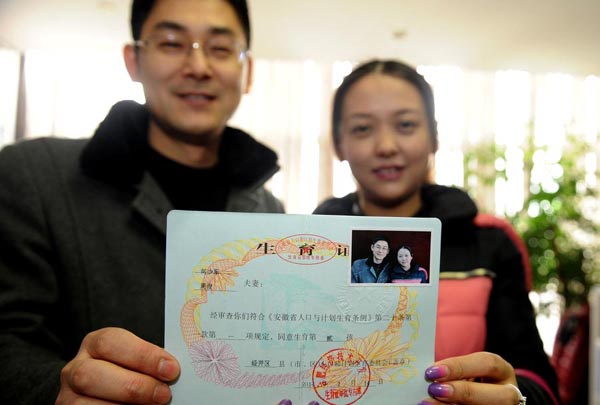Ministry denies rolling out nationwide two-child policy as early as this year
Updated: 2015-07-23 11:35
(chinadaily.com.cn)
|
||||||||
 |
|
A couple gets the birth certificate for their second child on Feb 14, 2014. [Photo/Xinhua] |
No timetable has been set to allow all couples in the country to have a second child, said National Health and Family Planning Commission on Wednesday.
The top family planning body refused to confirm a media report that claimed the government will probably introduce a two-child policy across the country as early as this year, while experts voiced support for the highly expected policy and said they expect it to be launched in 2016, Beijing Morning Post reported Thursday.
Financial media outlet China Business Network reported Wednesday that further relaxation of the family planning policy would come as early as this year if everything goes well. The report cited anonymous sources who participated in the policy survey as saying that relevant departments, including the National Health and Family Planning Commission, have begun assessing the policy and would push it ahead.
In a response to the report, the commission said Wednesday evening that currently there is no timetable on when to allow all couples to have a second child, and its stance on the matter is still consistent with the last press conference on July 10.
Yang Wenzhuang, director of the family planning grassroots guidance department under the commission, said on July 10 that the relaxation of the family planning policy in 2013, which allows couples with one spouse being an only child to have a second child, helped lay a solid foundation for future adjustments to the birth rules.
The number of couples who qualify is about 11 million, with nearly 70 percent of them born after 1980, Yang said.
Largely due to the policy relaxation, China had 16.8 million new births last year, 470,000 more than 2013, statistics from the National Health and Family Planning Commission show. Yang expected a bigger increase this year.
"That helps decision-makers make more precise demographic development forecasts and buys more time for socioeconomic and infrastructure preparation to welcome more babies," Yang said.
However, more adjustments are required to "address a major demographic challenge facing the nation: that problems in the population structure, particularly rapid aging, affect economic growth," he added.

 Across America over the week (July 17- July 23)
Across America over the week (July 17- July 23)
 Unusual but true: 'Love' conquers all
Unusual but true: 'Love' conquers all
 Six dead as rainstorms wreak havoc in China
Six dead as rainstorms wreak havoc in China
 Guangzhou Evergrande stun Bayern in penalty shootout
Guangzhou Evergrande stun Bayern in penalty shootout
 10 domestic films to see this summer
10 domestic films to see this summer
 Tricks airports use to scare away birds
Tricks airports use to scare away birds
 The highs and lows of a stock market investor
The highs and lows of a stock market investor
 Culture insider: 7 things you may not know about Major Heat
Culture insider: 7 things you may not know about Major Heat
Most Viewed
Editor's Picks

|

|

|

|

|

|
Today's Top News
China eyes deepened cooperation with overseas NGOs
Beijing condemns Somali attack, mourns deaths
Monster Hunt breaks Chinese box office record
Olympic bid panel cites city's merits
Astronomers discover most Earth-like planet yet
Seattle Chinatown leader killed in shooting
Flight details of Obama's Kenya trip leaked
2 killed, several injured in Louisiana theater shooting
US Weekly

|

|







